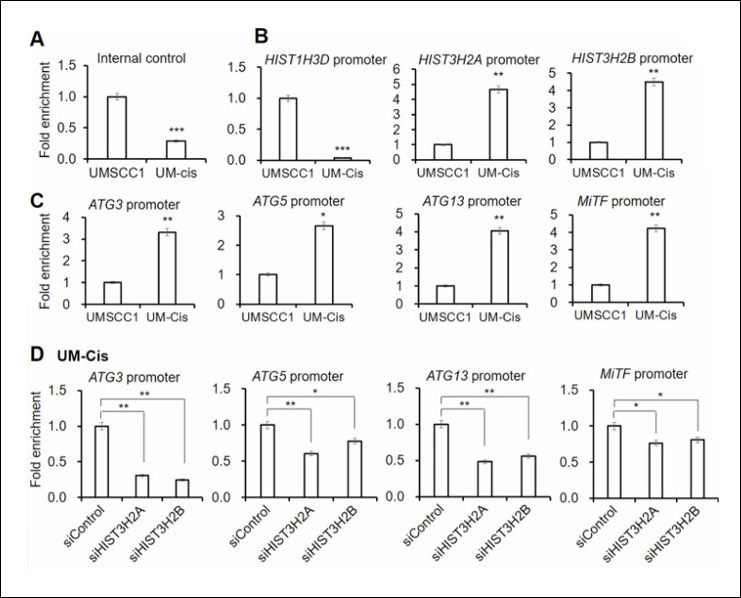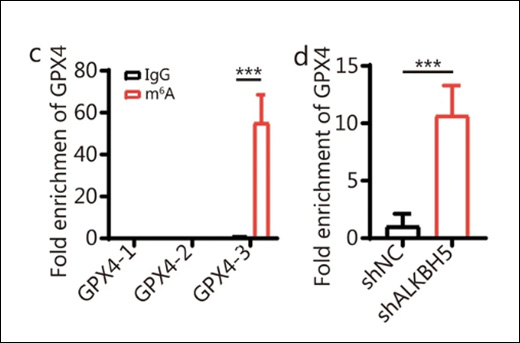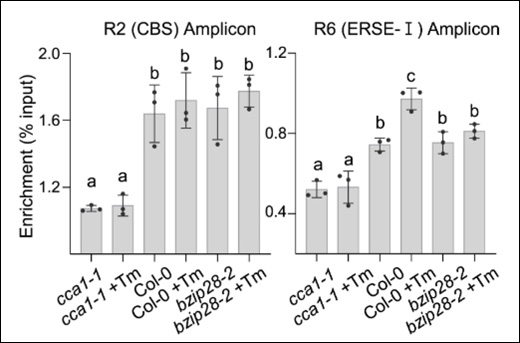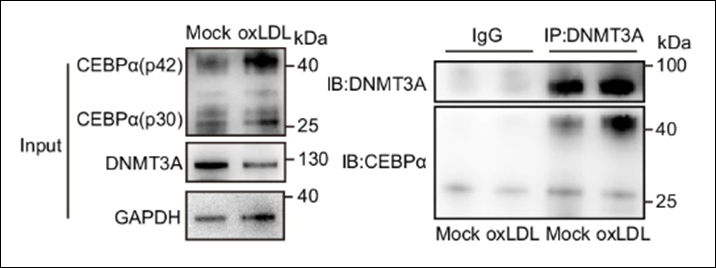Zhou Y et. al. (May 2023). Effect of prenatal perfluoroheptanoic acid exposure on spermatogenesis in offspring mice Ecotoxicol Environ Saf. 260:115072.
This study investigated the effect of prenatal exposure to perfluoroheptanoic acid (PFHpA), a persistent organic pollutant, on the spermatogenesis of male offspring mice. The results showed that prenatal PFHpA exposure caused adverse effects on seminiferous tubules and testicular RNA methylation, leading to impaired sperm quality and disrupted spermatogenesis, indicating reproductive toxicity.
(Products Used: EpiQuik m6A RNA Methylation Quantification Kit (Colorimetric))
Yu F et. al. (May 2023). RBM33 is a unique m6A RNA-binding protein that regulates ALKBH5 demethylase activity and substrate selectivity Mol Cell.
In this study, a previously unrecognized m6A RNA-binding protein called RBM33 is identified. RBM33 forms a complex with the m6A demethylase ALKBH5 and regulates its demethylase activity and substrate selectivity by recruiting ALKBH5 to specific mRNA transcripts. The study also reveals the critical role of RBM33 in the tumorigenesis of head-neck squamous cell carcinoma (HNSCC) through its promotion of autophagy via the demethylation and stabilization of DDIT4 mRNA by ALKBH5.
(Products Used: EpiQuik m6A RNA Methylation Quantification Kit (Colorimetric))
Chen J et. al. (May 2023). METTL3 promotes pancreatic cancer proliferation and stemness by increasing stability of ID2 mRNA in a m6A-dependent manner Cancer Lett. 565:216222.
This study investigated the role and mechanism of lnc KCNQ1OT1 in doxorubicin (DOX) resistance in breast cancer (BC). The findings revealed that lnc KCNQ1OT1, regulated by METTL3 through m6A modification, enhanced DOX resistance in BC cells by inhibiting the miR-103a-3p/MDR1 axis, highlighting a potential therapeutic target to overcome DOX resistance in BC.
(Products Used: EpiQuik CUT&RUN m6A RNA Enrichment (MeRIP) Kit)
Wu H et. al. (May 2023). Dietary Supplementation of Inulin Contributes to the Prevention of Estrogen Receptor-Negative Mammary Cancer by Alteration of Gut Microbial Communities and Epigenetic Regulations Int J Mol Sci. 24(10)
In this study, dietary supplementation of inulin was found to contribute to the prevention of estrogen receptor-negative mammary cancer by altering gut microbial communities and epigenetic regulations. Inulin-supplemented mice showed inhibited tumor growth, distinct gut microbiome, increased diversity, higher levels of propionic acid, and decreased expression of epigenetic-modulating proteins and factors related to tumor cell proliferation and survival. These findings suggest that inulin consumption may be a promising strategy for breast cancer prevention by modulating microbial composition.
(Products Used: EpiQuik Nuclear Extraction Kit, EpiQuik DNMT Activity/Inhibition ELISA Easy Kit (Colorimetric), EpiQuik HDAC Activity/Inhibition Assay Kit (Colorimetric), EpiQuik HAT Activity/Inhibition Assay Kit)
Reyes-Mata MP et. al. (May 2023). Global DNA Methylation and Hydroxymethylation Levels in PBMCs Are Altered in RRMS Patients Treated with IFN-β and GA-A Preliminary Study Int J Mol Sci. 24(10)
In this preliminary study, the global levels of DNA methylation and hydroxymethylation in Peripheral Blood Mononuclear Cells (PBMCs) were examined in multiple sclerosis (MS) patients treated with Interferon beta (IFN-β) and Glatiramer Acetate (GA), as well as in untreated patients and healthy controls. The results showed a decrease in DNA methylation levels in treated patients compared to untreated patients and healthy controls, and both DNA methylation and hydroxymethylation levels correlated with clinical variables. However, no biomarker has been identified yet that can predict the potential response to therapy in MS patients.
(Products Used: FitAmp Blood and Cultured Cell DNA Extraction Kit, MethylFlash Methylated DNA Quantification Kit (Fluorometric), MethylFlash Hydroxymethylated DNA Quantification Kit (Fluorometric), EpiQuik Global Histone H3 Acetylation Assay Kit, EpiQuik Global Histone H4 Acetylation Assay Kit)
Zhang J et. al. (June 2023). Gain-of-function mutations in the catalytic domain of DOT1L promote lung cancer malignant phenotypes via the MAPK/ERK signaling pathway Sci Adv. 9(22):eadc9273.
This study identified gain-of-function mutations, particularly the R231Q mutation, in the histone methyltransferase DOT1L in lung cancer. The R231Q mutation enhanced substrate binding ability, promoted cell growth and drug resistance, and activated the MAPK/ERK signaling pathway through H3K79me2 enrichment, suggesting potential therapeutic strategies targeting DOT1L and the MAPK/ERK axis for precise treatment of lung cancer.
(Products Used: EpiQuik Total Histone Extraction Kit)
Wang XY et. al. (May 2023). KDM4B down-regulation facilitated breast cancer cell stemness via PHGDH upregulation in H3K36me3-dependent manner Mol Cell Biochem.
This study explored the role of lysine demethylase 4B (KDM4B) in breast cancer and found that its down-regulation was associated with poor prognosis in patients. KDM4B was shown to inhibit proliferation, metastasis, epithelial-mesenchymal transition (EMT), and cell stemness in breast cancer cells by regulating the expression of PHGDH through modulation of H3K36me3, suggesting the KDM4B/PHGDH axis as a potential prognostic factor and therapeutic target in breast cancer.
(Products Used: EpiQuik Total Histone Extraction Kit)
Yang C et. al. (May 2023). Discovery of new tetrahydroisoquinolines as potent and selective LSD1 inhibitors for the treatment of MLL-rearranged leukemia Eur J Med Chem. 257:115516.
In this study, a tetracyclic tetrahydroisoquinoline compound called FY-21 was identified as a potent and selective inhibitor of LSD1, a promising target for cancer therapy. FY-21 demonstrated inhibitory effects on leukemia cell proliferation, colony formation, and increased p53 expression, while also reducing the mRNA levels of HOXA9 and MEIS1 transcription factors. In vivo studies further confirmed the potential of FY-21 as a lead compound for the development of effective LSD1 inhibitors for the treatment of acute myeloid leukemia.
(Products Used: EpiQuik Total Histone Extraction Kit)
Possamai-Della T et. al. (May 2023). Prenatal Stress Induces Long-Term Behavioral Sex-Dependent Changes in Rats Offspring: the Role of the HPA Axis and Epigenetics Mol Neurobiol.
This study investigates the effects of prenatal stress on behavior, hypothalamus-pituitary-adrenal (HPA) axis, and epigenetic parameters in stressed dams and their offspring. The results show that prenatal stress induces manic behavior in female offspring, accompanied by hyperactivity of the HPA axis and epigenetic alterations, highlighting the impact of prenatal stress on behavior, stress response, and epigenetic profiles in offspring.
(Products Used: EpiQuik Nuclear Extraction Kit II (Nucleic Acid-Free))
Fang A et. al. (May 2023). Inhibition of miR-200b-3p confers broad-spectrum resistance to viral infection by targeting TBK1 mBio. :e0086723.
In this study, the researchers investigated the regulatory role of microRNA-200b-3p (miR-200b-3p) during viral infection and found that its upregulation suppresses type I interferon (IFN-I) production by targeting the TBK1 gene. Inhibiting miR-200b-3p enhances IFN-I production, leading to effective suppression of viral replication and improved survival rates, highlighting its potential as a broad-spectrum therapeutic target for antiviral interventions.
(Products Used: ChromaFlash High-Sensitivity ChIP Kit)
Zhang H et. al. (May 2023). Different viral effectors suppress hormone-mediated antiviral immunity of rice coordinated by OsNPR1 Nat Commun. 14(1):3011.
In this study, researchers investigated the interplay between salicylic acid (SA) and jasmonic acid (JA) signaling pathways in monocot rice during viral infection. They found that viral effectors, including the P2 protein of rice stripe virus, disrupt the coordinated antiviral immunity mediated by SA and JA through degradation of OsNPR1 and modulation of JA signaling, revealing a general strategy employed by different rice viruses to facilitate viral pathogenicity.
(Products Used: EpiQuik Plant ChIP Kit)




 Cart (0)
Cart (0)













